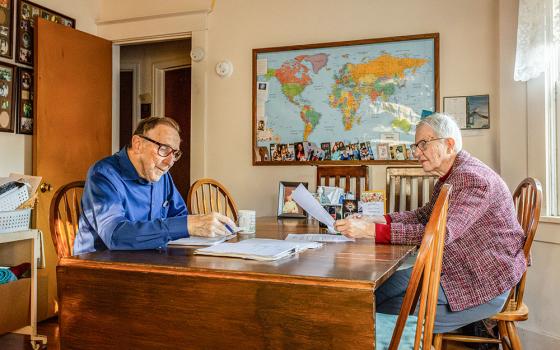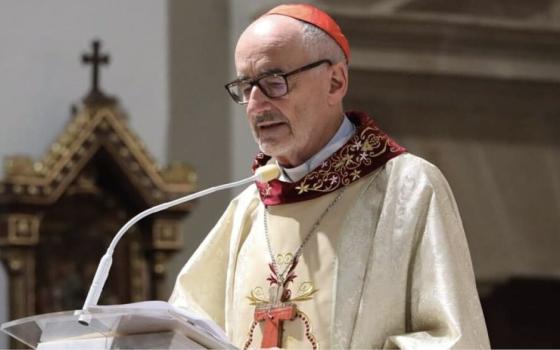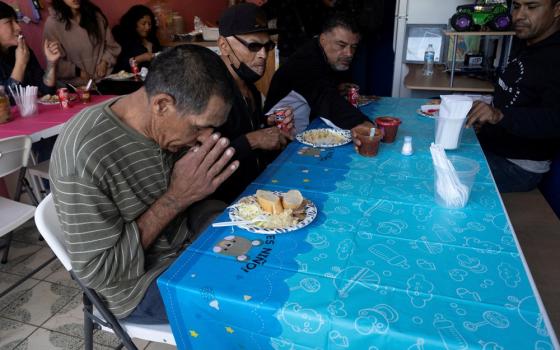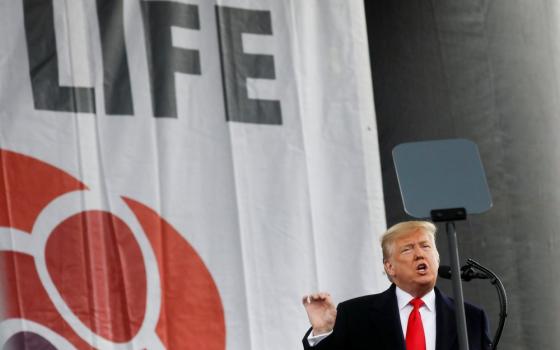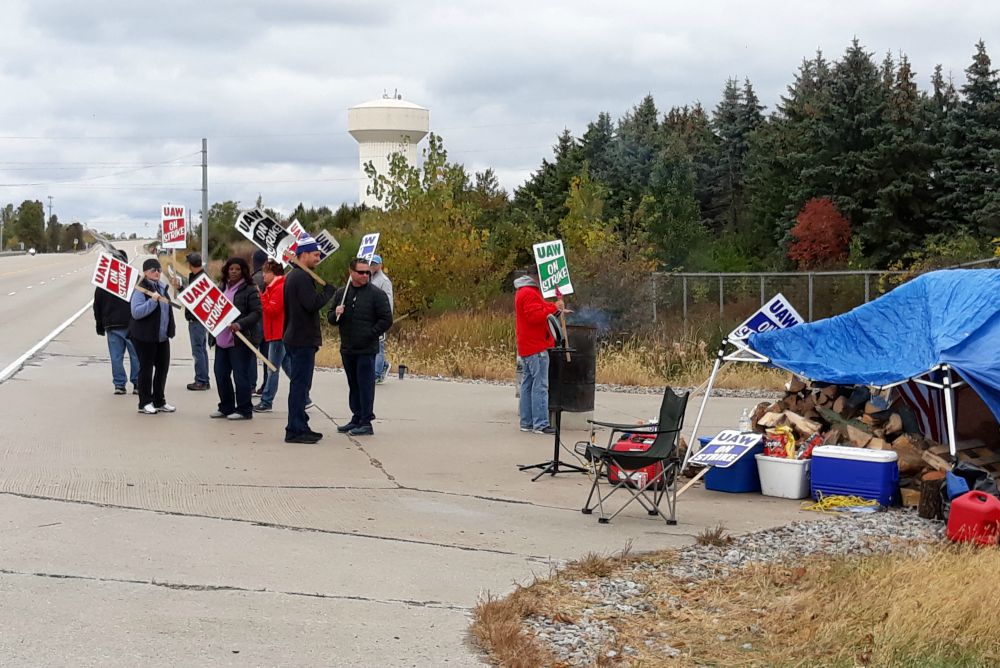
United Auto Workers members picket at one of the driveways of the General Motors plant located outside of Fort Wayne, Indiana, on Oct. 17. (Don Clemmer)
For Sarah Beckstedt, the ongoing strike of the United Auto Workers at General Motors plants across the country finds her in the roles of both afflicted and comforter. Employed at the GM plant southwest of Fort Wayne, Indiana, since 2008, she has also served for nearly the last two years as one of nine chaplains, and the only Catholic one, within the union and the company.
"Everybody struggles in their own way," Beckstedt said. "Yes, we were told to be prepared for this to happen. But life happens. Unexpected expenses happen."
Last Friday, a tentative agreement between the UAW national council and GM was reached, but the union voted to keep workers, about 48,000, on strike until members in 55 GM plants vote to ratify it. Ballots are due Oct. 25.
As the strike resulting from a national contract dispute entered its second month the week of Oct. 14, the mother of two has started working as an Uber driver during the time she has between family, the picket line and being present to her fellow union members at the Local 2209 UAW hall in Roanoke, down the road from GM.
Advertisement
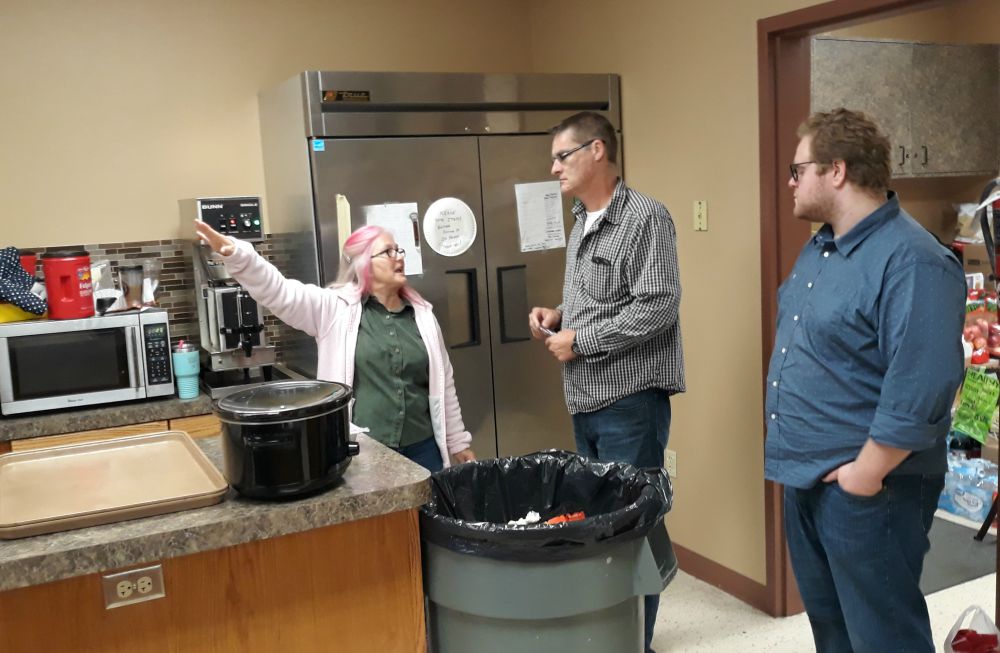
Belva Parkison, a non-denomational chaplain to workers at General Motors, gives the leadership of an area Baptist church a tour of the facilities where striking autoworkers are being served food 24/7 at their union hall in Roanoke, Indiana, on Oct. 17. (Don Clemmer)
"We are here for moral support, lending an ear," Beckstedt said of her chaplaincy work, of providing solidarity and accompaniment to her fellow workers in various life challenges and circumstances. During the strike, she said, this has become her "first priority." Beckstedt, a lifelong Catholic, attends St. Vincent de Paul Catholic Church, a large suburban parish in Fort Wayne, where she says the disruptive and chaotic nature of life during the strike means her encounters with other parishioners have been limited.
"I haven't really had the time to sit down and talk with people," Beckstedt said. "I've had people come up and say, 'Hey, is everything OK?' And I'm like, 'Yep, everything's good. Are you OK?' And that's pretty much our time."
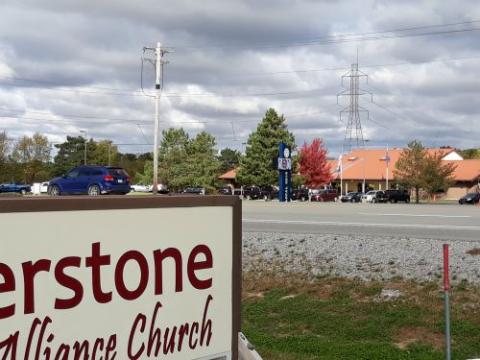
The union hall for United Auto Workers Local 2209 in Roanoke, Indiana, is directly across the road from Cornerstone Alliance Church, a congregation that has responded to the strike by organizing a rotation of preparing and serving meals to striking workers. (Don Clemmer)
The prolonged national strike has left a local footprint in northeast Indiana, touching on old structures of solidarity in the community and springing up new ones in its path. With over 4,000 workers, the plant is the third largest employer in Allen County, behind two hospital networks.
"There's also a huge trickle-down effect," Beckstedt noted, as vendors that do business with GM in the areas have been hit as well. "It's not just our union. It's outside — our suppliers, our distribution centers, people that supply our vending machines, all of it."
Local Catholic outreach entities have noticed the footprint of the strike, if anecdotally.
"The past two days, there hasn't been anything of any sort left over," John Martin, assistant to the director of St. Mary's Soup Kitchen, based out of St. Mary Mother of God parish in downtown Fort Wayne said on Oct. 17. The kitchen, which has been a cornerstone of Catholic social outreach in the city for nearly 45 years, produces 120 gallons of soup daily.
While UAW has taken the measure of increasing their members' strike pay to $275 a week, Philip Marlin, an hourly worker and a Catholic whose wife is employed by the local diocese, noted that unpredictable living expenses and depleted savings are a reality for many people.
"They're hurting," Marlin said.
Holli Murphy, president of the local 2209 chapter, said that community outreach during the strike — including donations to a food pantry, as well as clothes, toiletries, diapers and formula, pet food, and even fire wood for the barrels warming the workers on the picket line — has been "amazing." This support, she said, has come from family-owned businesses, dealerships, restaurants and churches.
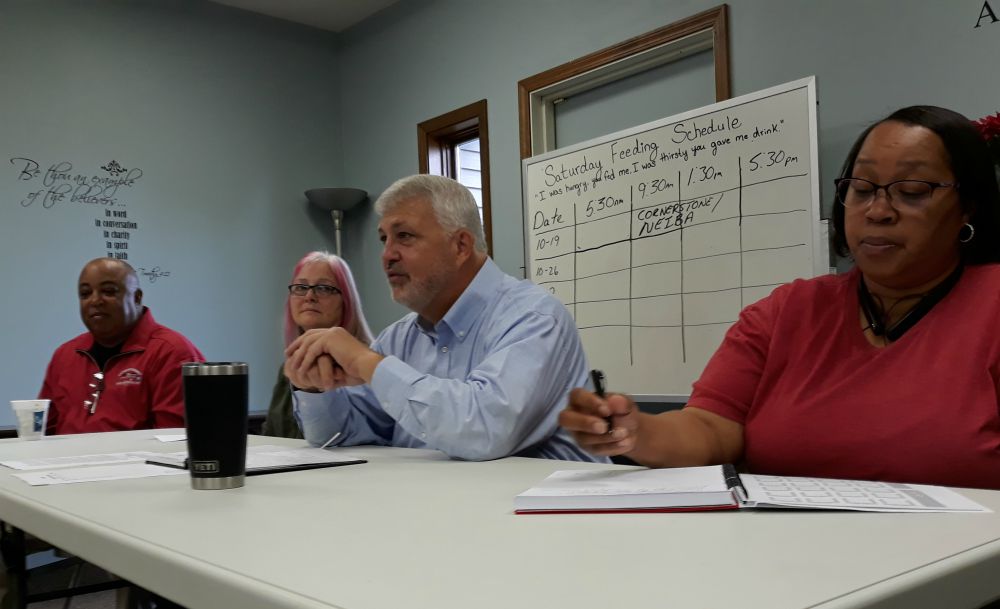
Robert Hooker, second from right, addresses area pastors about organizing a rotation of preparing and serving meals to striking autoworkers. Hooker is an elder of Cornerstone Alliance Church in Roanoke. (Don Clemmer)
For Robert Hooker, an elder at Cornerstone Alliance Church in Roanoke, Indiana, directly across the street from the UAW hall, the decision to get involved was as simple as "Who is my neighbor?"
His church's parking lot is used for non-union vehicles of people visiting the UAW, and driving past the picket line day after day, he was struck with the realization, "These are our brothers and sisters."
As the strike entered its second month, Hooker contacted Murphy and learned that, while the UAW is running a kitchen 24/7 out of the hall, supplies were getting low and workers were beginning to show up for meals with their families.
"It's not about the UAW. It's not about GM. It's about families," Hooker said to a small gathering of area pastors — mostly Baptist and evangelical — on Oct. 17, with whom he sought to establish a rotation for their congregations to provide food and volunteers for different meal shifts in the coming weeks, starting on Saturdays but hoping to build out from there.
"It's time for the church to step up to be the church." Hooker noted, adding that Jesus said "I was hungry and you fed me" in Matthew 25. "He didn't say 'I was hungry because.' " Hooker said that his wife was incredulous when she learned what he was trying to start, but that he draws comfort from how quickly and enthusiastically other faith communities have responded. "It's a God thing," he said.
Belva Parkison, a non-denominational chaplain for UAW, said the ecumenism of service spearheaded by Cornerstone and the community outreach in general gives her goosebumps.
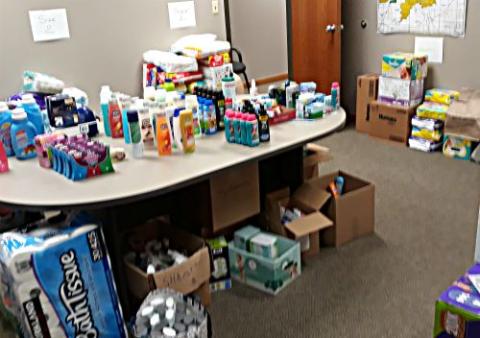
Donations of diapers and other toiletries sit an office at the Local 2209 chapter of United Auto Workers in Roanoke, Indiana (Don Clemmer)
"It's love. It's caring. When people are in need, people come out of the woodwork," she said. She added that the strike resonates because of issues that not all people fully grasp.
"It's not just about us at this union hall. It's not just about us down the street at the General Motors plant. We are representing people of the working class wanting a better life," she said. "We just want to be able to take care of our families and live day to day. And if we can't make a living wage, if we can't do those kind of things, then we're hurting. And that's what we're striving for, just to get the working class a living wage and benefits so that we can survive."
Grounded in her Catholic faith, Beckstedt sees the solidarity of her union, overcoming their differences amidst adversity to stand hand in hand, as a model of how love and friendship "will bring us together." She said, "If we keep spreading that, peace can happen."
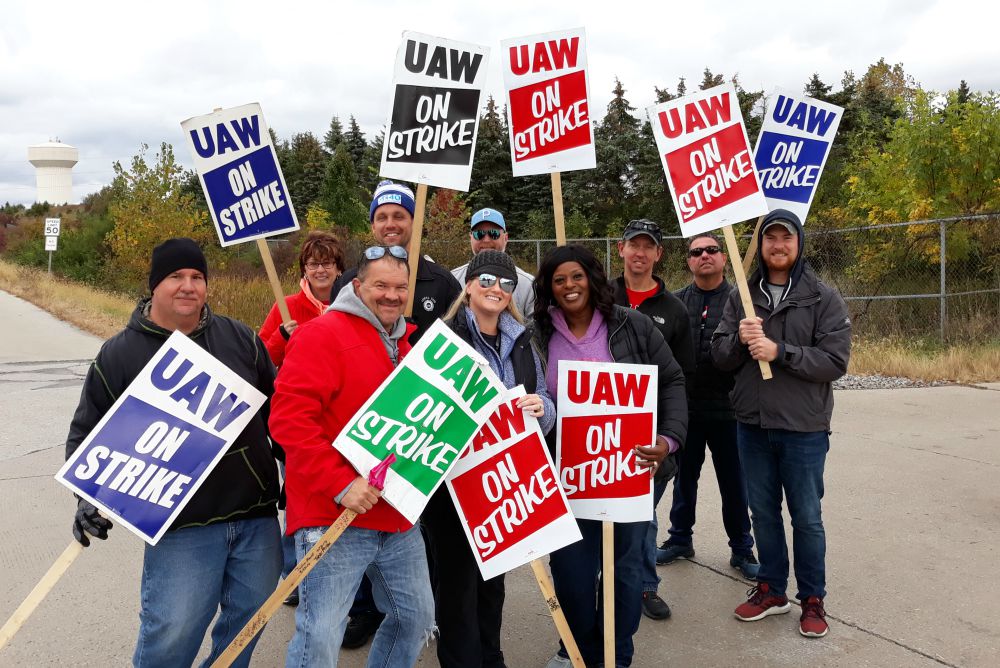
United Auto Workers members outside the Fort Wayne General Motors plant, on Oct. 17 (Don Clemmer)
[Don Clemmer is a journalist, communications professional and former staffer of the U.S. Conference of Catholic Bishops. He writes from Indiana. Follow him on Twitter: @clemmer_don.]
